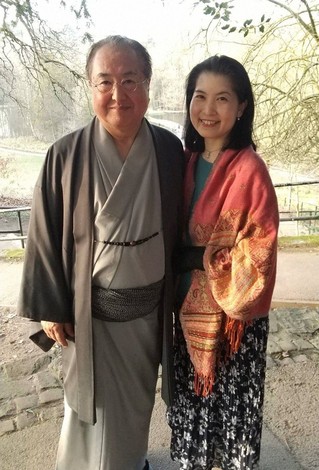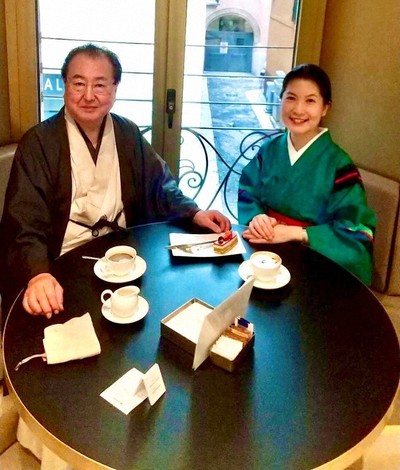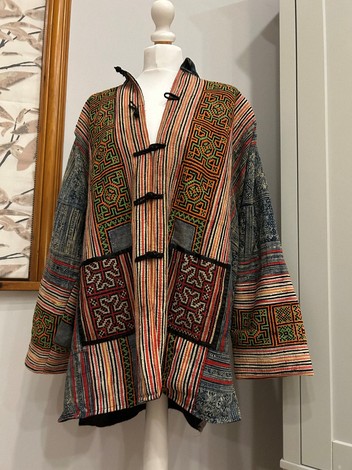
Damian Flanagan’s friend, Kazumi Shimodate, left, in Japanese dress with his partner Mariko Tsukinowa, on their travels around Britain. (Photo courtesy of Mariko Tsukinowa).
By Damian Flanagan
Recently, while I was in the U.K., the distinguished London correspondent of a Japanese newspaper wrote to me asking me if he could interview me about some literary articles he wanted to write. I could have gone to London to meet him but, being lazy, I invited him up instead to my home town. I thought I might take him somewhere a little bit fancy — the kind of place where you need to wear a jacket and collar — so we could chat things over.
But when he arrived, I discovered an unexpected flaw in my plan: He was casually dressed in jeans and sneakers. I quickly realized that a change of venue would be required.
Not so long ago, it seemed like I was the one showing up in jeans and a t-shirt when interviewed by an older, be-suited journalist. So I smiled inwardly at the thought that it was now me standing there in a jacket and collar while the journalist, younger in years, dressed down.
Shortly afterwards I had a Japanese friend — a theatre director — coming to stay with me for a couple of weeks and thought I might like to take him to the same dress-up place where I had intended to take the London correspondent. So I emailed him a few days before he was due to arrive, advising him to pack a jacket and tie if at all possible. I didn’t really think the advice was necessary as my friend — educated at both Cambridge and Oxford and very poshly spoken in English — was the type of person to always wear a jacket, and quite often sported a dandy-ish cravat to go with it.

Kazumi Shimodate, left, and Mariko Tsukinowa in Japanese dress on their travels around Europe (Photo courtesy of Mariko Tsukinowa)
But I received a most unexpected response. My friend informed me that he was already arrived in England and unfortunately did not have a jacket with him. In fact, he continued, he did not have any Western clothing with him. Since I had last seen him a few years ago, he explained, he had switched to wearing exclusively Japanese clothing no matter where he was in the world. This was partly because his father — a daily kimono wearer — had left him in his will a large collection of kimono that he had never worn. But also, a friend of his in Kyoto had recently died and his widow had decided that my friend was the best person to pass on her husband’s collection of highly expensive kimono.
Before he knew it, my director friend had a room in his apartment completely full of kimono. And so, he eventually decided he should start wearing them. He had, it seems, the previous year travelled all around Europe wearing Japanese dress. It had a transformational effect on people’s response to him. People treated him everywhere with great courtesy, interest and affection. Whereas in Western dress, he often passed under the radar — barely being noticed — in Japanese dress everyone was curious to know who exactly he was. Service in hotels noticeably improved and he jokingly remarked that when travelling in Sicily, he felt much safer, as people seemed to assume he was a Yakuza boss and not to be messed with.
I soon discovered for myself that he was right about the positive attitudes towards Japanese dress… I had already booked in my friend for a smart lunch and rang the organizer to explain that my guest unfortunately did not have a jacket and tie, but would like to come in full Japanese dress and would that be OK? “Yes, of course. If anything, it is better” came the excited response, followed up later with the remark, “I really quite admire him”.
The two weeks I spent with my friend visiting places in my native region with him dressed in kimono were quite memorable. He was travelling with his partner, who also wore Japanese attire most of the time. At one point, I brought them into a local convenience store at almost midnight and it was a surreal sight watching them glide about the aisles in their “geta” sandals and kimono. Another time we visited a local theatre and were afforded five-star treatment — a director of the theatre came down to show us around and offered us complimentary tickets to that evening’s show. On a few occasions we discovered ourselves in busy bars and found people insisting on treating us to drinks. My conclusion: want five-star service? Pack Japanese dress.

Damian Flanagan’s beloved Vietnamese jacket. (Damian Flanagan)
Seeing my friend’s sartorial transformation made me start thinking about my own clothing choices. In my younger days, I must admit to some pretty outlandish garment selections. I used to love wearing clothes from all over the world and would don embroidered Indian kurta and colourful Ukrainian peasant shirts and once, when I went to Vietnam, I went completely nuts and bought a whole array of clothing fashioned by the hill tribes there. I walked round in this kind of attire for years, but my partner would discreetly whisper in my ear that I might want to tone it down and only wear the multi-coloured Vietnamese jacket “on special occasions”. And so, I was finally talked into the sober and restrained wardrobe of the culturally sensitive middle-aged.
But observing my friend’s late-in-life clothing revolution, I began to think I might have overdone it a bit and maybe should start wearing something more interesting and characterful myself.
There is a well established phenomenon known as “The Return to Japan”. A Japanese person, having spent long years succumbing in some form or other to Western cultural norms, reappraises in later life the comforting embrace of traditional Japanese ways. Yet wearing Japanese dress — as a signifier of rich cultural traditions — can have a much greater international appeal than many Japanese people realize.
There is also something in life called “The Return to Your True Self”, where you stop worrying about what others think you should or should not be thinking, doing or wearing and simply do your own thing. The Mao suit, Steve Jobs’ black mock turtleneck, Zelenskyy’s combat suit, all have become iconic. You never know, the Vietnamese jacket may soon be making a comeback.
@DamianFlanagan
(This is Part 68 of a series)
In this column, Damian Flanagan, a researcher in Japanese literature, ponders about Japanese culture as he travels back and forth between Japan and Britain.
Profile:
Damian Flanagan is an author and critic born in Britain in 1969. He studied in Tokyo and Kyoto between 1989 and 1990 while a student at Cambridge University. He was engaged in research activities at Kobe University from 1993 through 1999. After taking the master’s and doctoral courses in Japanese literature, he earned a Ph.D. in 2000. He is now based in both Nishinomiya, Hyogo Prefecture, and Manchester. He is the author of “Natsume Soseki: Superstar of World Literature” (Sekai Bungaku no superstar Natsume Soseki).


AloJapan.com